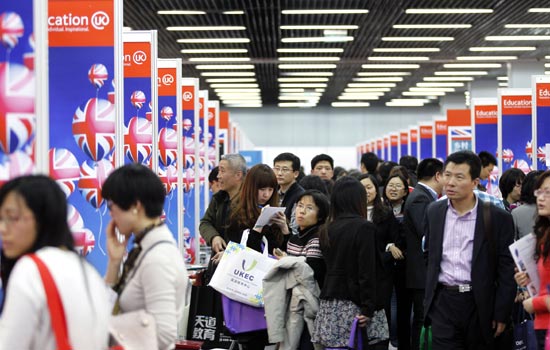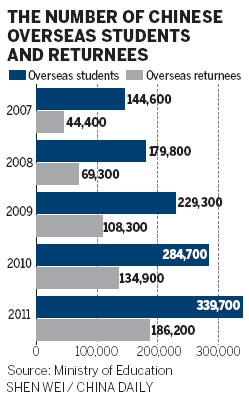Attractive job offers no longer guaranteed
Updated: 2012-07-04 11:33
By Cheng Yingqi in Beijing and Zhang Xiaomin in Dalian, Liaoning (China Daily)
|
||||||||
|
 |
|
Visitors check out the UK booth at the 17th China International Education Exhibition Tour in Beijing this March. Hundreds of education institutions from more than 30 countries and regions participated in the exhibition in the hope of enrolling more Chinese students. [Photo/Xinhua] |
After earning a bachelor's degree in business administration in the United Kingdom, Wang Xiuqi did not expect his only job offer to be at a container port in Dalian with migrant workers who had never been to university.
The 25-year-old's job was to type information about containers entering and leaving the port into a computer. Since he returned to China after graduation in June 2010, he has not managed to find a better job.
"I can't use what I learned from college at all, and I'm not reconciled to this," Wang said. He quit the job in May, and has started the "torturous" process of job hunting.
"I speak good English, I have overseas experience, but now I'm not sure whether I would get a job that offers an air-conditioned office and 2,000 to 3,000 yuan ($314 to $471) per month," Wang said.
"And I don't understand why it's just so difficult for an overseas returnee like me to find a job."
International recruiting company Hays reported in its 2012 college graduates employment report that 66 percent of employers across Asia would consider employing or sponsoring qualified overseas candidates in areas short of skilled workers. That is down from 79 percent in 2011.
"With the fast development and globalization of China, overseas returnees have begun to lose the advantage in terms of language skills. In many cases, a graduate from a local Chinese university can speak as good English as an overseas returnee," said Simon Lance, regional director of Hays in China.
"But this doesn't necessarily mean that a returnee loses his or her competitive advantage in the job market. What brings value to an overseas returnee is really their international exposure, overseas working experience and culture awareness," Lance said.
"Overseas returnees need to be aware of their own advantage, personal desire and career direction. Even if the starting salary might be low, they probably will have better career progression due to the independence and problem solving skills developed from the overseas study or working experience," he said.

The average starting salary for overseas returnees is around 3,000 yuan per month.
About 43 percent earn less than 5,000 yuan and only 15 percent exceed 10,000 yuan, according to latest survey of Education International Cooperation Group, an overseas study consulting agency.
"A 6,000-yuan job is really hard to find, but the living costs are really high," said Zhao Yaming, 27, who has just graduated with a master's degree in Australia.
"I spent around 600,000 yuan studying in Australia. That means it will take 10 years for me to recover the cost of studying abroad, if I can save every cent I make," Zhao said.
However, an employment expert said returnees are only losing the competitive advantage for entry-level positions.
"In fact, China's companies lack high-end talent with overseas experience, at least five years working experience in world-famous companies, good professional background and managerial experience," said Chen Xi, a senior career consultant at Zhaopin Ltd, an online human resources company.
"Most returnees who feel it is difficult to find a job majored in finance, language or management in college, but they are not likely to gain executive positions immediately after graduation.
"For most Chinese overseas graduates, working for a few years before returning might be a better choice," Chen said.
"The expanding number of overseas returnees might be one reason for the increasing pressure in the labor market," said Zhang Tao, deputy secretary-general of the UK branch of the Western Returned Scholars Association.
Founded in 1913, the Western Returned Scholars Association is a Chinese government-affiliated entity consisting of more than 15,000 Chinese scholars and researchers who have studied abroad.
"Studying overseas used to be confined to elite education, but now it has become an alternative of general higher education or even secondary education," Zhang said. "The era that all the returnees are granted well-paid offers has ended."
"Starting their own businesses might be a good choice for returnees, since governments at all levels have been supporting returnees with business plans. But returnees should first be sure that they are capable of handling the challenge of running a company," she said.
Contact the writers at chengyingqi@chinadaily.com.cn and zhangxiaomin@chinadaily.com.cn

 Relief reaches isolated village
Relief reaches isolated village
 Rainfall poses new threats to quake-hit region
Rainfall poses new threats to quake-hit region
 Funerals begin for Boston bombing victims
Funerals begin for Boston bombing victims
 Quake takeaway from China's Air Force
Quake takeaway from China's Air Force
 Obama celebrates young inventors at science fair
Obama celebrates young inventors at science fair
 Earth Day marked around the world
Earth Day marked around the world
 Volunteer team helping students find sense of normalcy
Volunteer team helping students find sense of normalcy
 Ethnic groups quick to join rescue efforts
Ethnic groups quick to join rescue efforts
Most Viewed
Editor's Picks

|

|

|

|

|

|
Today's Top News
Health new priority for quake zone
Xi meets US top military officer
Japan's boats driven out of Diaoyu
China mulls online shopping legislation
Bird flu death toll rises to 22
Putin appoints new ambassador to China
Japanese ships blocked from Diaoyu Islands
Inspired by Guan, more Chinese pick up golf
US Weekly

|

|






